Proper NounWhat is a proper noun? A proper noun is a unique (not generic) name for a particular individual, location, or object. In English, proper nouns have always been capitalized, irrespective of the fact where they come in a phrase. They are also known as proper names since they equip nouns with a specific/certain name. Every noun can be split into various types; one of them being: common and proper. A common noun is a generalized phrase for a single object in a category or group. Some common noun examples include- girl, boy, house, etc.  Your official title or name is a proper noun. A proper noun is a term that we use to describe a specific person, location, or organization, such as Peter, Mary, England, French, or Apple. A name is a noun, but it's a very particular kind of noun: a proper noun. Proper nouns in English are subject to additional regulations. 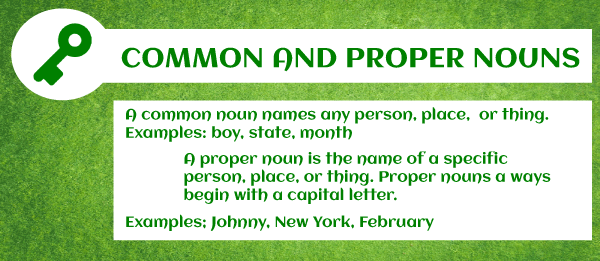 Proper nouns have two separate characteristics: They focus on particular, one-of-a-kind goods, and they always initiate with capital letters, regardless of where they appear in a statement. Whereas in the case of a proper noun, you name a noun specifically like London Bridge; Dubai; India Gate, Taj Mahal, etc. The distinction between common nouns and proper nouns is normally obvious, although it can sometimes be hard to understand. It makes no real difference if a noun is proper or common when we talk because it has no effect on syntax. 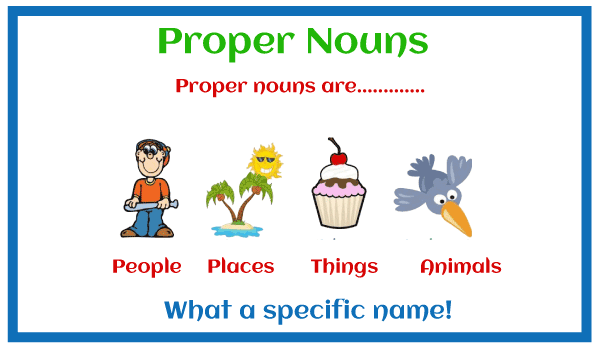 However, whenever we write, we ought to recognize which nouns are proper, and we need to know where and how to put capital letters. Here, we'll look more closely at proper nouns, present proper noun instances, and teach you how to employ a proper noun correctly. Keep in mind that nouns are terms that name individuals, animals, locations, objects, and concepts. Every noun is further subdivided into common and proper nouns. Once you've seen some instances and come up with a couple of your own, the difference becomes extremely clear. 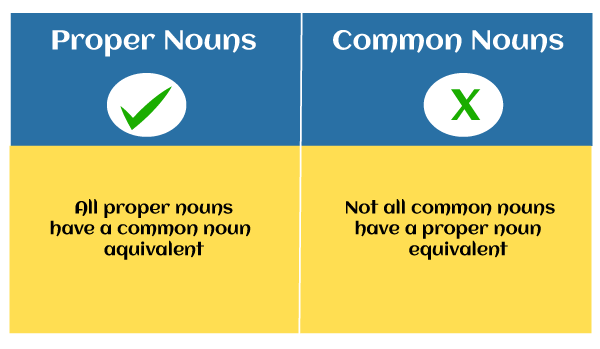 Examples of Proper NounsProper noun examples are contrasted with common nouns in the following sentences. It's worth noting that proper nouns are distinct and one-of-a-kind, whereas common nouns are far more generic. 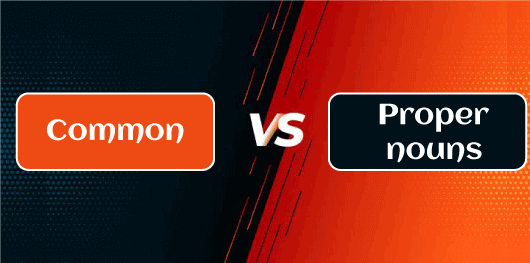 Common noun: She wants to become a writer. Proper noun: Jk Rowling is an eminent writer who has written many bestsellers. Common noun: I find a cat the cutest pet animal. Proper noun: Timmy is the cutest and adorable kitten I have ever seen. Common noun: Give your friends some cookies and tea. Proper noun: She is craving to have some Oreo. Common noun: We are making a plan to go somewhere outside the city. Proper noun: Let us all plan a trip to the Maldives this vacation. Common noun: My professor teaches the concepts very nicely and precisely Proper noun: Mrs. Larrisa is very apt in her teaching and understands the class students well. Common noun: I wish to see all the planets someday Proper noun: I can see Venus tonight. Common noun: She is always roaming with her friends every weekend Proper noun: She never leaves Paul alone. Common noun: There are numerous essential files on my table; make sure to take care of them. Proper noun: British Council has a huge library with an enormous book collection. These above-mentioned examples clearly help in the demarcation of common nouns and proper nouns along with their appropriate usage in the sentence. 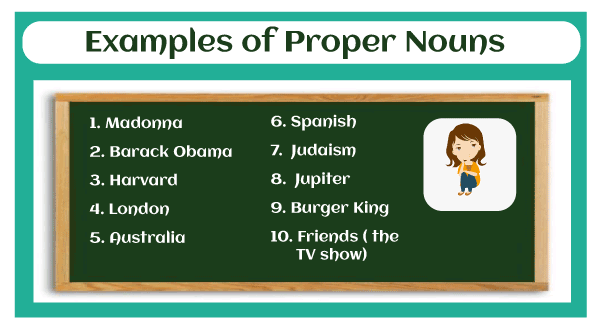 How to use Proper Noun- Some Rules and TipsProper Nouns are in Upper Case letters RULE: The very first letter of a name or proper noun should always be capitalized. This covers people's, locations', and businesses' names, as well as the days of the week and month. As an example:
There are NO exceptions, of course, in proper grammatical writing. However, for creative reasons, individuals may opt to disregard the norm in order to give their writing a distinctive or "contemporary" look. This is common in commercials or company logos. We propose that you follow the guideline without failure for proper writing, especially in assessments. 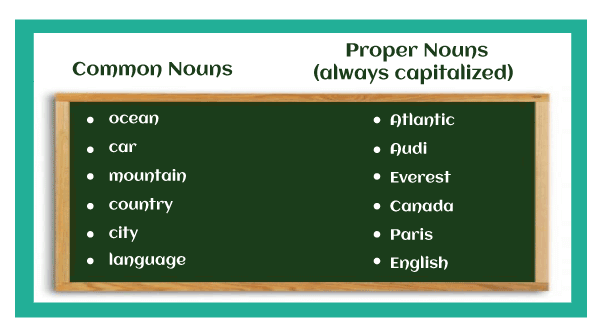 Proper Nouns Devoid of THE It is advisable not to use "the" when referring to person names. As an example: Shahrukh Khan- not The Shahrukh Khan Alia Bhatt- not The Alia Bhatt Sudha Murthy- not The Sudha Murthy We don't generally use "the" in company names. As an example: Sony, Nissan, Volkswagen, and Apple (not the Sony, etc.) General Motors, Air France, and American Airlines are just a few examples. Warner Bros., Brown & Sons, Ltd. All these are without "the" before them. If a firm's complete (licensed) name begins with "The," we employ "The" if we are using the full name, for instance: The Globe Publication General Co., Ltd. In this situation, "The" is included in the company's name and, like all names, must be in uppercase. For businesses, banks, and hotels titled after a founder or other individual (with -'s or -s), we do not generally say "the." As an instance: shops- Colorbar, Marks & Spencer, Woodland banks PSB Bank hotels, restaurants Mary's Hotel, Smita's Cafe, McDonald's churches, cathedrals St Paul Church, St Mary Cathedral We don't generally use "the" in-place names. As an instance: Washington (not The Washington), Florence, and Kyoto are examples of towns. states and regions- Central Europe, Houston, and Ohio Britain, Germany, and Argentina are examples of countries. Eurasia, Europe, and Latin America islands Corsica mountain ranges like Everest Exceptional Cases! If a nation's name encompasses words like "States," "Kingdom," "Republic," and so on, we use "the": Like the United States, the United Kingdom, the French Republic, and so on. Moreover, we never utilize the term "the" along with"President/Doctor/Mr, etc. + Name": the president, the king - President Biden (we never employ the term -"The President Biden") the captain, the detective Like Captain Kiro, Detective Colom the doctor, the professor- Dr. Relli, Professor Della my uncle, your aunt Uncle Jou, Aunt Marina Mr. Gams (not the Mr. Gams), Mrs. Jacib, and so on. Have a glance at these example statements: I wish to talk to the doctor. I wish to talk to Doctor Brown. Who became the president prior to President Pranab Mukherjee? We never employ the term "the" with "Lake/Mount + Name": the lake- Lake Titicaca the mount Mount Everest Let us have a look at a few proper noun examples They reside beside Lake Titicaca. They have a majestic view across the lake. We never employ the term "the" for road, street, square, park, etc.: streets etc. like Lalalajpat Rai Street, Gaur Road, Seventh Avenue squares etc. like Trafalgar Square, and parks, etc. like Children's Park, Japan Gardens Various influential and vital buildings have titles comprising of more than two words (for instance, Indira Gandhi Airport). If the initial term is the name of an individual or location, we never utilize the term "the": Individuals like - Indira Gandhi Airport, Mary's Cathedral places like Chennai Airport, Bandra Station, and so on It is always preferable to utilize the term "the" for names/titles of canal, river, sea, and ocean: canals the Panama Canal rivers the Yangtze seas the Arabian Sea oceans the Indian Ocean It is always preferable to utilize the term "the" for plural name of individual and locations: Individuals (families, for instance) the Singhs countries the Canada, the USA island groups the Andaman and Nicobar Islands mountain ranges, the Aravali Range, the Alps Have a look at the following proper noun examples He saw the Singhs today. It was Mr. Singh's anniversary. The Andrott Island is one of the largest islands in India. Mount Everest is at the peak of the Himalayas. We always utilize the term "the" in the following names; hotels, restaurants, the Asian Hotel, the Manila Restaurant banks the State Bank Of India cinemas, theatres, the Golcha Cinema museums the Ancient Museum, buildings the India Gate, newspapers the Times of India organizations the United Nations, the BBC It is always preferable to utilize the term "the" for names including "of": the Tower of London the London School of Economics the Statue of Liberty How to Use Proper Noun?Proper nouns are simple to employ if you understand what they are. Simply use them in the statements just like you would common nouns, capitalizing them. Here are a few samples to go and get you kickstarted Kevin had anticipated an easy mathematics teacher but instead received Ms. Gibbs, whose excessive expectations and quick temper made the session unpleasant. → The word "teacher" is a common noun. Ms. Gibbs is a proper noun. Claire had a chocolate desire, and it wasn't just any cookie. She went shopping and bought a packet of Oreo. The term "cookie" is a common noun. The word Oreo is a proper noun. We wished to try something else, so we went to Flavor of Asia. The word "restaurant" is a common noun. Flavor of Asia is a proper noun. Proper Noun ExamplesHere are a few Proper Noun instances;
Next TopicAbstract Noun |